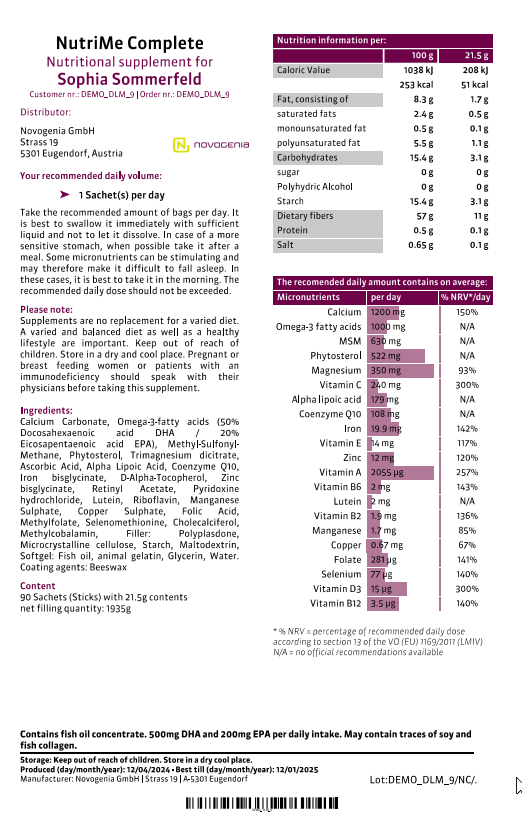NutriMe
Complete
Personalized dietary supplement: your genes know what your body needs
€376.20
Why NutriMe Complete is your best choice:
Optimally tailored
NutriMe Complete contains exactly the right nutrients for you – perfectly tailored based on your personal gene analysis.
Convenient
Each daily portion is personalized and carries your name – for easy intake in everyday life.
90 days of peace of mind
We deliver 90-day supplies with convenient daily portions.
Optimal compatibility
We use only high-quality organic raw materials.

It’s really quite logical. Standard mixes from the drugstore do not meet your personal nutrient needs because they are based on average amounts. Individual nutrients can even be harmful or completely ineffective. NutriMe Complete, on the other hand, delivers exactly the micronutrients your body needs – precisely matched to your genetic requirements. No over- or under-supply, but exactly what your body truly needs.
NutriMe Complete fulfills important tasks for you
Amino acids, proteins, and DNA
Folic acid contributes to normal amino acid synthesis. Zinc contributes to normal DNA synthesis. Magnesium and zinc contribute to normal protein synthesis. Vitamin B6 contributes to normal cysteine synthesis.
Eyes
Vitamin A, vitamin B2, and zinc contribute to the maintenance of normal vision.
Blood
Vitamin B2 contributes to the maintenance of normal red blood cells. Vitamin D3 contributes to the normal calcium level in the blood. Iron and vitamins B6 and B12 contribute to the normal formation of red blood cells. Iron contributes to the normal formation of hemoglobin. Folic acid contributes to normal blood formation, and calcium contributes to normal blood clotting. Vitamin C contributes to normal collagen formation for the normal function of blood vessels. Phytosterol helps maintain normal cholesterol levels in the blood. Zinc contributes to the maintenance of normal testosterone levels in the blood.
Reproduction
Zinc contributes to normal fertility and reproduction. Folic acid contributes to maternal tissue growth during pregnancy. Selenium contributes to normal sperm formation.
Skin, hair, and nails
Vitamins A, B2, and zinc contribute to the maintenance of normal skin. Selenium and zinc contribute to the maintenance of normal hair and nails. Copper contributes to normal skin and hair pigmentation. Vitamin C contributes to normal collagen formation for the normal function of the skin. Manganese contributes to normal connective tissue formation.
Immune system
Vitamins A, B6, B12, C, and D3 contribute to the normal function of the immune system. This is especially true for vitamin C during and after intense physical exercise. Iron, folic acid, copper, selenium, and zinc also contribute to the normal function of the immune system.
Bones and teeth
Magnesium, manganese, vitamin D3, and zinc contribute to the maintenance of normal bones. Magnesium and vitamin D3 contribute to the maintenance of normal teeth. Calcium is needed for the maintenance of normal bones and teeth. Vitamin C contributes to normal collagen formation for the normal function of bones, cartilage, teeth, and gums.
Fatigue, tiredness, and mental & cognitive function
Iron, magnesium, folic acid, and vitamins B2, B6, and B12 contribute to the reduction of tiredness and fatigue. Folic acid, magnesium, and vitamins B6, B12, and C contribute to normal psychological function. Iron and zinc contribute to normal cognitive function.
Muscles
Vitamin D3, calcium, and magnesium contribute to the maintenance of normal muscle function.
Nervous system
Copper, magnesium, and vitamins B2, B6, B12, and C contribute to the normal function of the nervous system. Calcium contributes to normal signal transmission between nerve cells.
Mucous membranes
Vitamin A and vitamin B2 contribute to the maintenance of normal mucous membranes.
Metabolism
Vitamins A and B2 contribute to normal iron metabolism. Vitamin B6 contributes to protein and glycogen metabolism. Iron, calcium, copper, magnesium, zinc, and vitamins B2, B12, B6, and C contribute to normal energy metabolism. Zinc contributes to normal fatty acid, carbohydrate, and acid-base metabolism, as well as to the normal metabolism of macronutrients and vitamin A. Folic acid, vitamin B2, and vitamin B12 contribute to normal homocysteine metabolism.
Cells
Vitamin A and calcium play a role in cell specialization. Iron, folic acid, calcium, magnesium, zinc, and vitamins B12 and D3 play a role in the process of cell division. Copper, manganese, selenium, and zinc, as well as vitamins B2 and C, contribute to the protection of cells from oxidative stress.

*Haftungsausschluss
Wissenschaft: Heute gibt es bereits etwa 4 Millionen wissenschaftliche Veröffentlichungen, die die Effekte bestimmter Gendefekte auf den menschlichen Körper untersucht haben. Eine typische Erkenntnis daraus klingt etwa so: „Wenn du den Gendefekt X hast, kann Vitamin Y nicht umgewandelt werden und bleibt wirkungslos.“ Nur wenn die Auswirkungen eines Gendefekts unabhängig durch mindestens drei verschiedene Studien nachgewiesen wurden, wird der Gentest in das Programm aufgenommen. Daher wird der Einfluss eines Gendefekts immer durch mehrere wissenschaftliche Studien gestützt, und die Quellen hierfür findest du im hinteren Teil jedes Kapitels. Die durch diese Analyse gegebenen genetischen Merkmale gelten somit als auf wissenschaftlichen Studien basierend.
Empfehlungen: Empfehlungen basierend auf deinem genetischen Profil. Die aus deinen genetischen Merkmalen abgeleiteten Empfehlungen sind oft nicht durch Studien bestimmt, sondern häufig logische Schlussfolgerungen. Ein Beispiel: Wenn ein bestimmter Wirkstoff aufgrund einer Genvariation nicht wirkt, lautet die Schlussfolgerung, auf ein anderes Vitamin mit ähnlicher Wirkung umzusteigen. Dies erreichen wir zum Beispiel durch Änderung deiner Kosmetikrezeptur oder Ergänzungsmittel. Es ist also wichtig zu verstehen, dass die von unseren Expert:innen entwickelten Empfehlungen nicht auf randomisierten, placebo-kontrollierten Studien basieren, sondern als logische Schlussfolgerungen auf Basis deiner genetischen Merkmale erstellt wurden.












